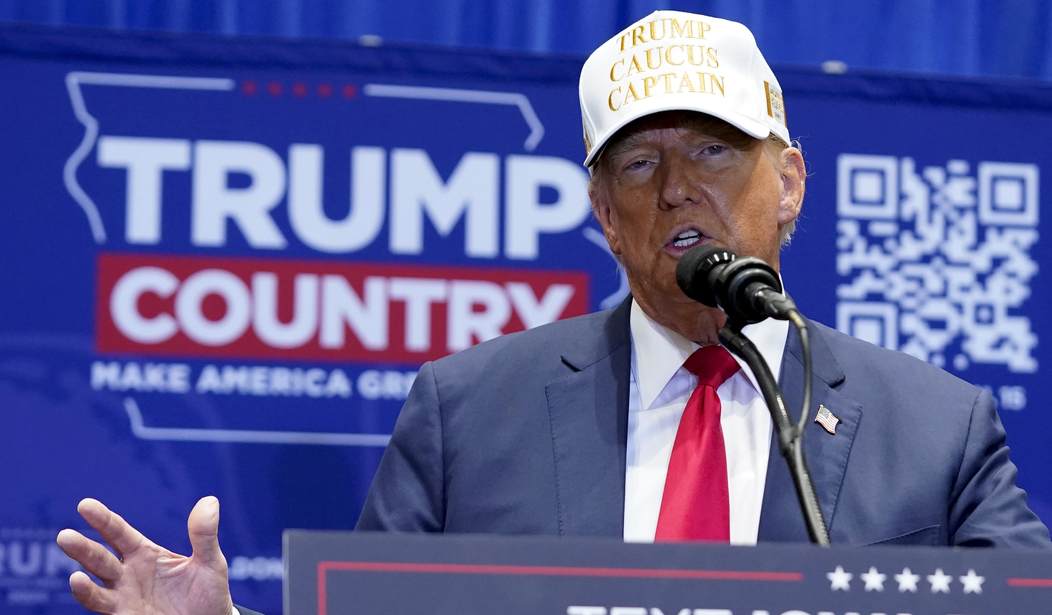Des Moines -- Even though it was the first time Republicans had voted in this presidential contest, there was a last-stand mentality here in Iowa among those who hoped to stop former President Donald Trump from reclaiming the Republican nomination. Their goal was to push the candidacy of Nikki Haley hard and hope that Haley, together with the fading Ron DeSantis, would not actually defeat Trump but keep him below 50% of the total vote. That way, they would argue that, in total, more GOP caucus voters had voted for someone other than Trump than voted for him.
It didn't work. Trump won with 51% of the vote and can now make the opposite argument: I won more votes than all the opposition combined. It's over. Why don't we just give me the nomination right now? An even shorter version of the night is: Trump won big, period.
He won 98 of Iowa's 99 counties. He won women voters. He won men. He won urban, suburban, and rural voters. He won every age group over 30, losing only the 18 to 29 group. He won evangelical Christians. He won college graduates. He won those without a college degree. In short, he won everybody.
Trump's across-the-board victory is sure to push the anti-Trump forces to wage an even more desperate battle against him in the New Hampshire primary, seven days away. Of course, Trump is leading in the polls there, too, although not nearly as decisively as he did in Iowa. But in New Hampshire, the anti-Trump forces' hope will be to convince enough Democrats and independent (known in New Hampshire as "undeclared") voters to take part in the Republican primary and defeat Trump.
They tried that in Iowa, where the rules allowed a Democrat or independent to come to the GOP primary, register as a Republican, and vote right away. According to media entrance polls, 16% of the electorate Monday night identified themselves as independent, while 2% were Democrats. At the caucus I covered, a precinct in the Des Moines suburb of Ankeny, there were a total of 180 votes. The party volunteers running the event told me that of that group, 25 people had registered as Republicans at the door. They didn't have any further information on that group, but it is safe to say they kept Haley in the game in a precinct in which Trump and DeSantis were fighting it out -- the final result was DeSantis, 58 votes; Trump 57 votes; Haley 56; Vivek Ramaswamy 8, and Ryan Binkley 1.
Recommended
Overall, in the entrance poll, Haley romped, just absolutely cleaned up, among voters who described themselves as "moderate" -- she won 63% of them. The problem was, those "moderate" voters made up only 9% of the total caucus electorate, according to the entrance polls. Fifty-two percent of all voters described themselves as "very conservative," and Trump won 61% of them, while 37% described themselves as "somewhat conservative," and Trump won 47% of them. (One percent of voters described themselves as "liberal," but that wasn't enough to get any data on how they voted.)
The night was a blow to Haley, who was not only rising in the polls but, rich with GOP big-donor money, actually spent more money on advertising in Iowa than either Trump or DeSantis. After the results were known, Haley engaged in some bravado by claiming the caucuses had made the Republican contest a two-candidate race, meaning herself and Trump. That is not what happened. Instead, the caucuses showed that the "moderate" camp inside the GOP just isn't big enough to put a candidate over the top. And at least on a really cold night in Iowa -- leaving the caucus, it was six below zero where I was in Ankeny -- not enough independents and moderates came out to push Haley to a win.
Then there was DeSantis, who was relying on solidly conservative Republican voters who nevertheless want the party to move on from Trump. Among the 52% of the caucus electorate calling themselves "very conservative," DeSantis won 26% to Trump's 61% (and Haley's 5%). Among the tiny "moderate" group, where Haley won with 63%, DeSantis won just 7%, indicating that he really did attract conservative voters.
Monday night was do-or-die for DeSantis. The polls, especially the influential Des Moines Register poll, had showed him slipping to third place behind Haley in the final days of the campaign; in the RealClearPolitics average of polls, DeSantis had fallen to three points behind Haley. The consensus among insiders, or at least those who didn't work for the DeSantis campaign, was that DeSantis could not survive a third-place finish. In conversations in the last few days of the race, DeSantis' surrogates and staffers said they just didn't think the polls were accurate. They believed that DeSantis' carefully built ground game would prevail over Haley when cold caucus night came.
They were right. Instead of losing by three points, DeSantis beat Haley by two points, 21.2% to 19.1%. DeSantis supporters were both relieved and eager to keep fighting. They were also really, really angry at media organizations that called the race for Trump so early that some caucus-goers hadn't even voted yet. They had a point -- that really shouldn't happen again; it wouldn't be hard for media organizations to agree on a time, immediately after all votes have been cast, to release projections.
Now the race moves on to New Hampshire, where the more "moderate" Republican primary electorate, including Democrats and undeclareds, is better for Haley than DeSantis -- but which Trump still leads by 14 points in the RealClearPolitics average. And then, were DeSantis to keep slogging, the race goes to South Carolina, where Trump is extremely popular -- many insiders believe he will beat Haley in her home state. So if DeSantis goes on, there is a good chance he will lose to Trump in New Hampshire and then lose to Trump in South Carolina, on top of losing to Trump in Iowa. Where will that get him? Nowhere.
The fact is, the Iowa caucuses confirmed what the polls had said for months. The Republican race is Donald Trump far ahead, and a couple of other candidates far behind. If that dynamic continues, it will not come as a shock that the candidate who is far ahead will win.
This content originally appeared on the Washington Examiner at washingtonexaminer.com/daily-memo/2798569/trump-wins-big-period/.
(Byron York is chief political correspondent for The Washington Examiner. For a deeper dive into many of the topics Byron covers, listen to his podcast, The Byron York Show, available on the Ricochet Audio Network at ricochet.com/series/byron-york-show and everywhere else podcasts are found.)

























Join the conversation as a VIP Member